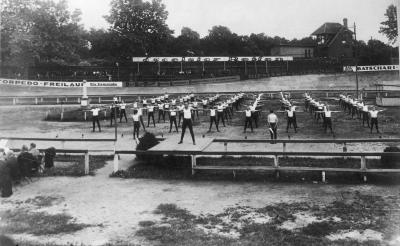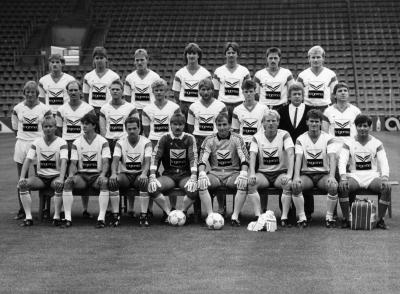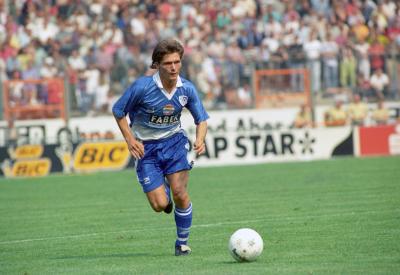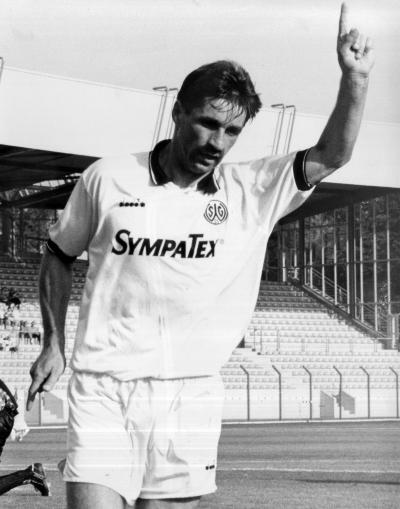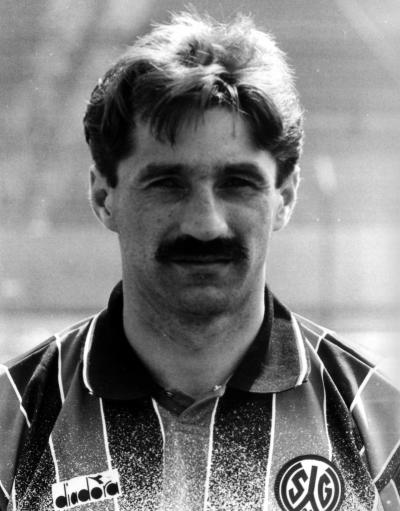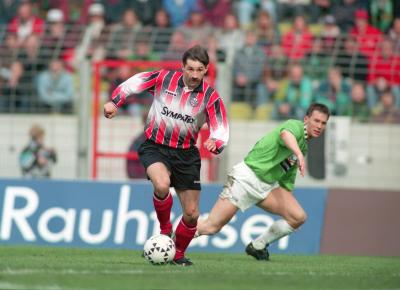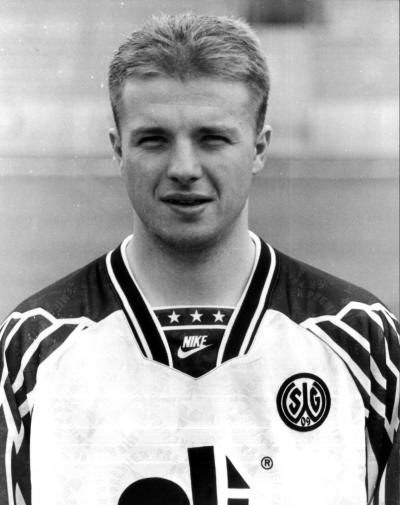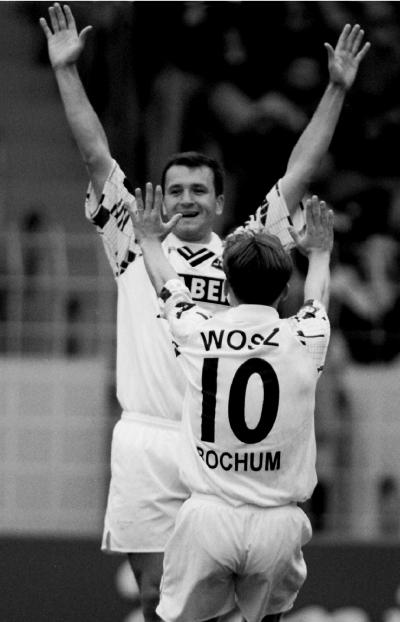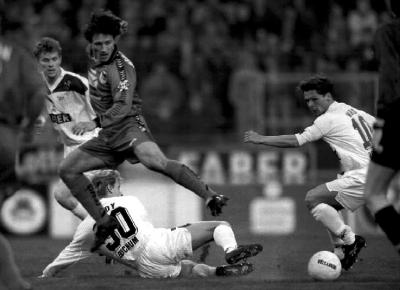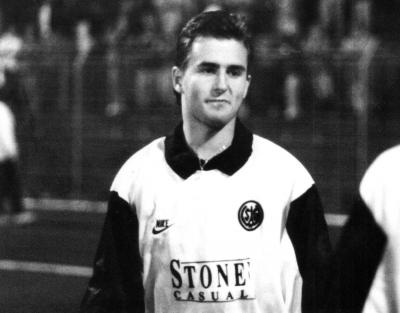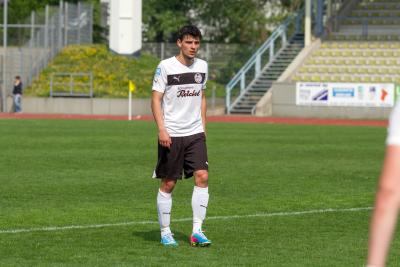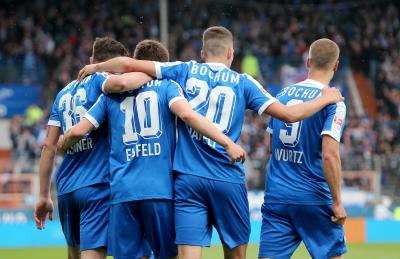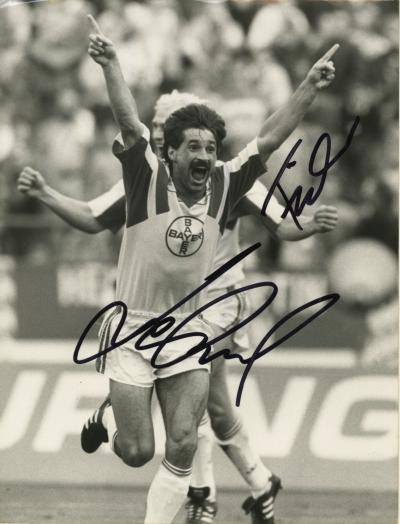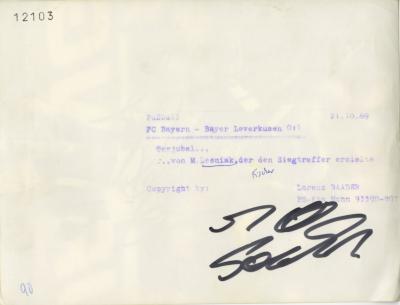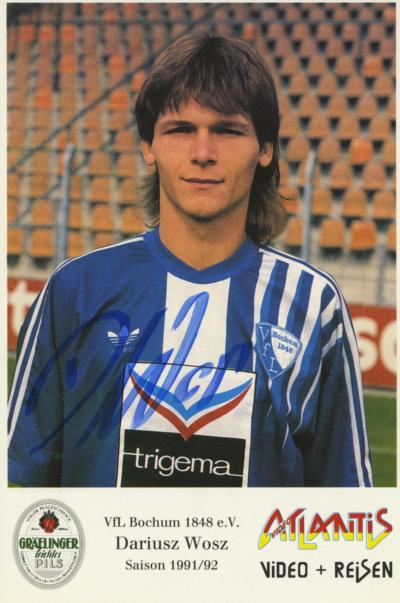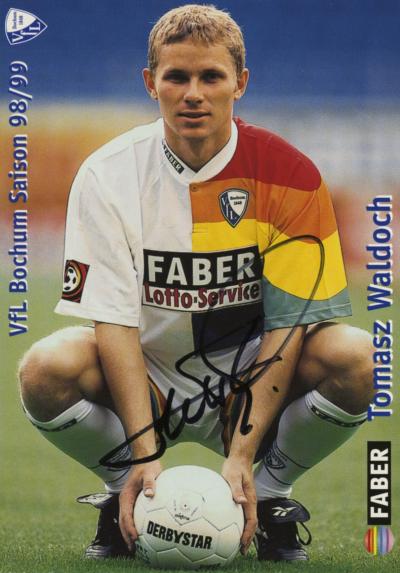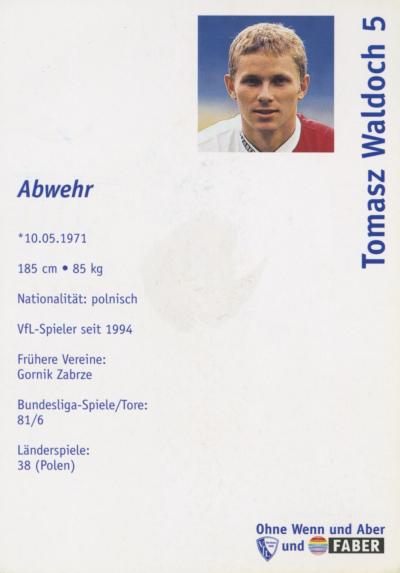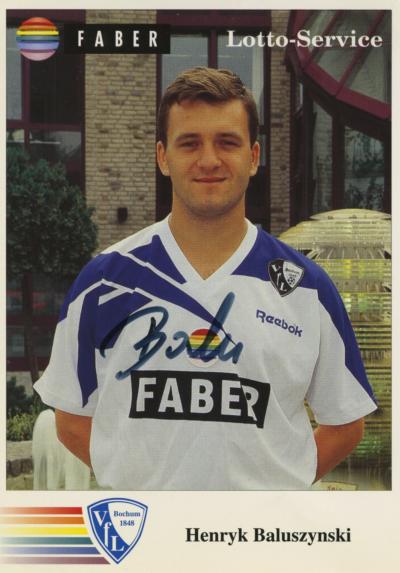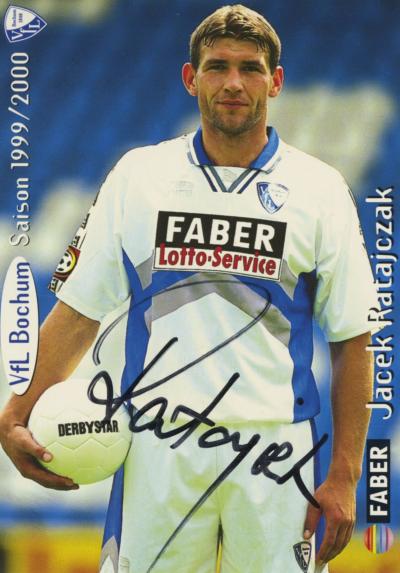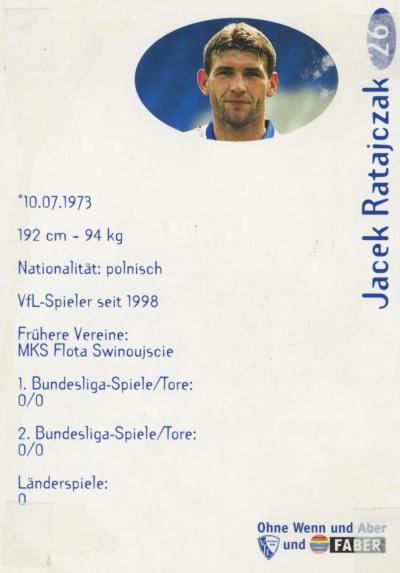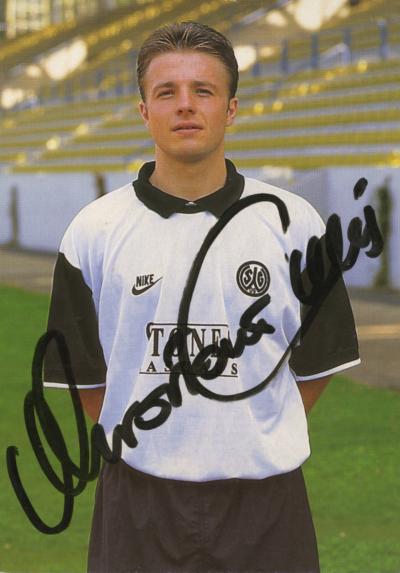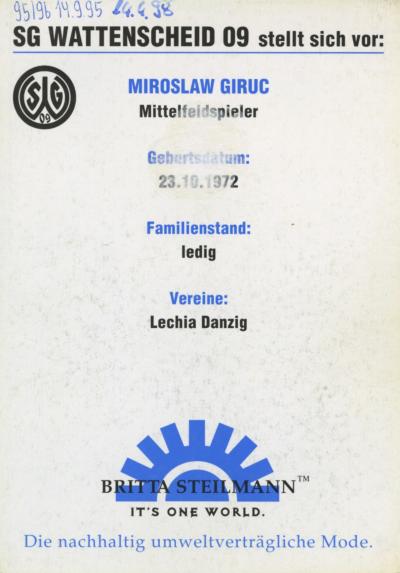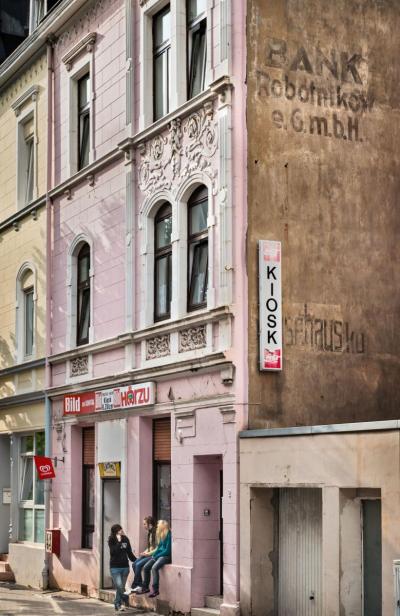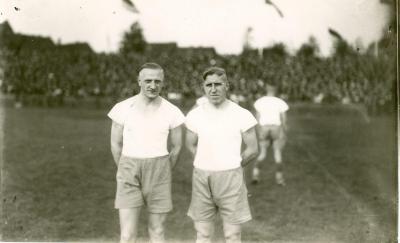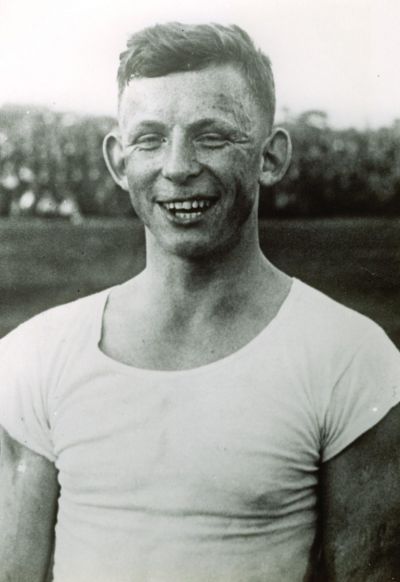From the Sokół club to Dariusz Wosz – Polish sport in Bochum

In the Bundesliga years since 1963, nine Polish athletes have played for VfL Bochum. It is no coincidence that Andrzej Iwan (1987-1989), Tomasz Waldoch (1994-1999) and Henryk Bałuszyński (1994-1998) three of the first four Polish players from Zabrze, the heart of the Upper Silesian mining region, came to Bochum. Their club Górnik Zabrze proudly bears the word “Górnik” (English “miner”) in the name.[23] For the fans, these players were players for the “Pott” [coalmining area] who were considered to be grafters and have “coal in their DNA”. This is because the rise of “Górnik” in Silesia was closely connected to the coal industry.[24] Waldoch, who later became a dual DFB Cup winner with Schalke 04, and Bałuszyński played during the most successful period when Bochum finished in fifth place in the final table in the Bundeliga in 1997 and earned a place in the UEFA Cup. Bałuszyński, who died at an early age, scored the first Bochum UEFA Cup goal of all time against Trabzonspor. Maciej Śliwowski (1990/91) also ranked as one of the first Poles to wear a Bochum kit. He was followed by Andrzej Rudy (1995/96), who had settled in the West “illegally” in 1988 and called Udo Lattek “the Polish Beckenbauer”[25], then Jacek Ratajczak (1998-2000), Thomas Zdebel (2003-2009), Marcin Mięcel (2007-2009), Piotr Ćwielong (2013-2016) and Paweł Dawidowicz (2016/2017).[26]
The Bochum icon Dariusz Wosz, who played for VfL between 1992-1998 and 2001-2007 and scored 41 goals, is not an “authentic” Pole despite his Sarmatian name. Instead, he comes from the German minority in Silesia. He came to Halle and to the GDR national team as a migrant during unification, then to Bochum and then to the German Federal national team for whom he played 17 times.[27] Wosz currently holds various roles at the Bochum club.[28]
Marek Leśniak became a similar legend for the second Bundesliga club in the Bochum city area, SG Wattenscheid 09. He scored 25 goals as striker between 1992 and 1995. In 1988, Leśniak was the youngest player to be released by the Polish Administration to play professionally in the West. The country needed currency desperately.[29] In 2010, he returned as trainer for a few months. Other signings from Poland included Mirosław Giruc (1994/95), Michał Probierz (1995-1997) and Krzysztof Kasak (2013/2014).[30]
The history of Polish sport in Bochum and Wattenscheid, as in the entire Ruhr area, reflects the history of the Polish and Masurian migration, and consequently the identity issues of the migrants who frequently defined themselves as Poles for the first time in Rhineland Westphalia as a result of external attribution and then through their own self-attribution. Three generations, which were severely affected by secular catastrophes, such as the two world wars and the Nazi dictatorship, which was profoundly hostile to Poles, set off on a tumultuous journey to a life in Germany. In the process of the emigration policy and the globalisation of elite football, athletes born in Poland came from the German minority, like Dariusz Wosz, but after the political shift the majority who came to Germany as professionals were Polish players. Like the Bochum professionals Tomasz Waldoch and Henryk Bałuszyński, they perpetuated the myths and legends of football in the Ruhr area[31], which lives from the relationship between regional concepts of identity and the field sport with its incarnate protagonists.[32] Today, it is estimated that there are around 2 million people with a Polish family background living in the Federal Republic; that constitutes around 2.5 % of the population.[33] The story of their immigration, but also of their sporting history[34], has become a vital and influential component of German history and of the history of the city of Bochum[35].
Diethelm Blecking, January 2021
[23] The first Polish player in the Bundesliga, Piotr Słomiany, who played for Schalke from 1967-1970, also switched from “Górnik” to the coal-mining district. (https://www.porta-polonica.de/de/atlas-der-erinnerungsorte/aus-dem-puett-die-profiliga-polen-und-masuren-im-ruhrgebietsfussball, accessed on 26/12/2020).
[24] Regarding football in Silesia and Górnik Zabrze see Radoslaw Zak, Der Fluch des schwarzen Goldes, in: Ballesterer Fußballmagazin 149 (2020), p. 17-21.
[25] Urban, Thomas, Schwarze Adler/Weiße Adler. Deutsche und polnische Fußballer im Räderwerk der Politik, Göttingen 2011, p. 154, more information about his career in the West which was also of interest to the Boulevard p. 153-157.
[27] For more on Wosz, see Urban, 2011, p. 161-163.
[28] https://www.vfl-bochum.de/news/uebersicht/verein/alles-gute-dariusz-wosz/ (accessed on 27/12/2020).
[29] cf. Urban, 2011, p. 152.
[31] For the myths and legends of the Ruhr area and the role of football, see the interview with Diethelm Blecking, in: Ballesterer Fußballmagazin 149 (2020), p. 29-31 and Blecking 2019, p. 29.
[32] cf. Stefan Goch, Zwischen Mythos und Selbstinszenierung: Fußball im Ruhrgebiet und das Image der Region, in: Westfälische Forschungen 2013, p. 103-118.
[33] With regard to this evidence that has barely been registered and to the full history of this large population group cf. Loew, Peter Oliver, Wir Unsichtbaren. Geschichte der Polen in Deutschland, Munich 2014.
[34] The catalogue published for an exhibition at the Westphalian State Museum of Industrial Culture in 2015 is a useful introduction to the relationships between migration and football: LWL-Industriemuseum (publ.), Von Kuzorra bis Özil. Die Geschichte von Fußball und Migration im Ruhrgebiet, Essen 2015.
[35] As far as the history of Bochum is concerned, however, Schade, 2009, points out the deficits in the way that its history is written and communicated. In this context, he identifies continuing stereotypes and sees “the portrayal of the Masurian and Polish immigration characterised by omission or superficiality, and often by negative stereotypes as well, with only very few exceptions.” (p. 51).
